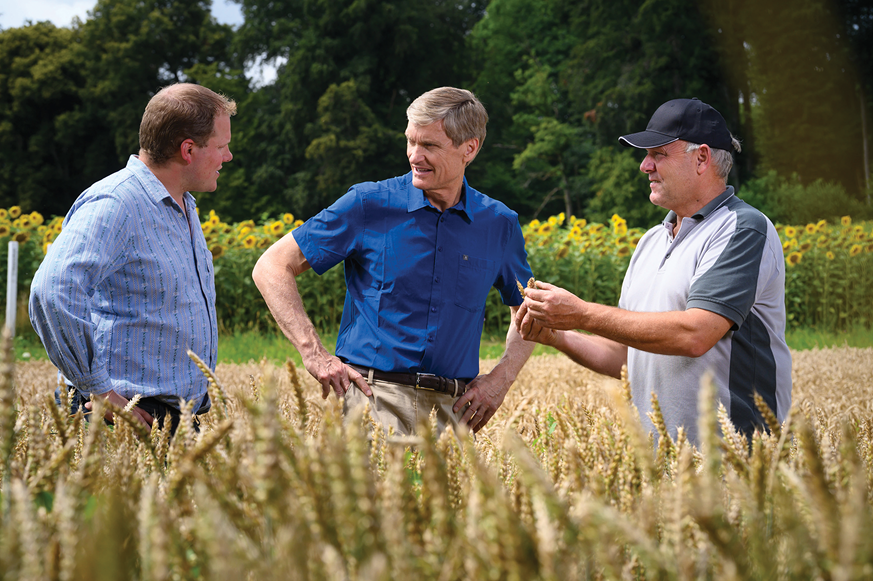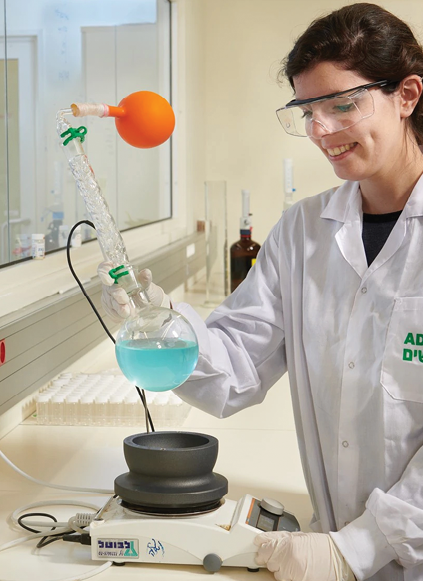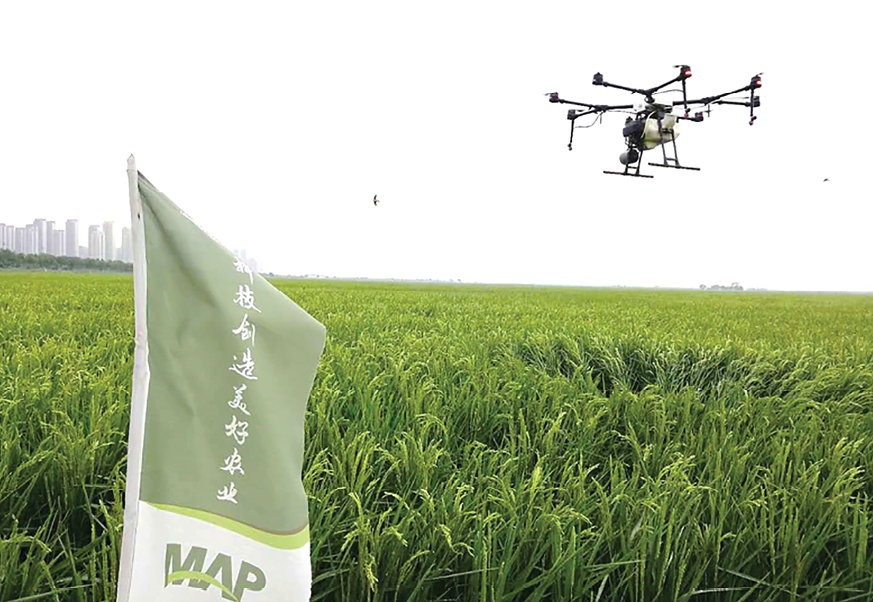- Home
- Media Kit
- Current Issue
- Past Issues
- Ad Specs-Submission
- Ad Print Settings
- Reprints (PDF)
- Photo Specifications (PDF)
- Contact Us

![]()
ONLINE

Helping Farmers
Safely Feed the World
Editors’ Note
Erik Fyrwald also serves as Chairman of the Syngenta Foundation for Sustainable Agriculture. He was previously President and Chief Executive Officer of Univar, a leading distributor of chemistry and related services; President of Ecolab, a cleaning and sanitation, water treatment, and oil and gas products and services provider; and Chairman, President and Chief Executive Officer of Nalco, a water treatment and oil and gas products and services company. He also previously served as Group Vice President of the Agriculture and Nutrition Division of DuPont Company. Fyrwald is currently Chairman of Adama Ltd., and Non-Executive Director of Bunge Limited and Eli Lilly and Company. He also serves on the Board of Directors for CropLife International, the Swiss-American Chamber of Commerce, and the UN World Food Program Farm to Market Initiative. Fyrwald holds a bachelor’s degree in chemical engineering from the University of Delaware and completed the Advanced Management Program at Harvard Business School.
Company Brief
Syngenta Group (syngenta.com) is one of the world’s leading agricultural technology and innovation companies, with roots going back more than 250 years. Its 49,000 people across more than 100 countries strive to transform agriculture through breakthrough products and technologies that play a vital role in enabling the food chain to feed the world safely, sustainably and with respect for our planet. Swiss-based and Chinese-owned, the group draws strength from its four business units – Syngenta Crop Protection headquartered in Switzerland, Syngenta Seeds headquartered in the United States, ADAMA® headquartered in Israel, and Syngenta Group China – that provide industry-leading ways to serve customers everywhere.

Erik Fyrwald talking with growers
Will you highlight the history of Syngenta and how the business has evolved?
Syngenta Group is a young company, yet each of our businesses has a long history of accomplishment stretching back over 250 years. Syngenta was created in 2000 through the merger of the agrichemical businesses of Novartis and AstraZeneca. In 2017, it was acquired by ChemChina, and in 2020, Syngenta Group was formed by bringing together Syngenta, ADAMA and the agricultural business of Sinochem. Today, we have sales of $23 billion and 48,000 people across more than 100 countries. Our four business units – Syngenta Crop Protection, Syngenta Seeds, ADAMA and Syngenta Group China – provide farmers everywhere with the technology and expertise they need to grow healthy, affordable and sustainable food.
How do you describe Syngenta’s culture and how critical is culture to the success of the company?
Our culture is central to our success and customers are central to our culture. To serve customers best, we consider it critical to be the most collaborative and trusted team in agriculture. We foster a corporate culture where every employee puts our purpose, “to help farmers safely feed the world and care for our precious environment,” along with safety and ethics, at the heart of what we are about. With this mindset, we earn the trust of our customers and communities, creating value for farmers, employees, suppliers and consumers.
We foster a workplace culture where we try to ensure everyone feels secure, included and valued. This is at the core of our values and it drives our approach to innovation and helps us all grow.

A Syngenta scientist in the lab
How has Syngenta adapted its business to address the challenges caused by the global pandemic?
During the pandemic, our priority has been to support the health and safety of our employees, their families and the communities where we operate, while creatively finding ways to keep serving our customers. We have worked very hard to support farmers as they continue to ensure the food supply. Many of our employees adapted quickly to working from home, using technology to connect virtually with colleagues and customers. Many other employees have had to stay on site, particularly in production and R&D. They are doing extraordinary work under challenging circumstances. Our production and R&D sites implemented a number of measures to protect our teams, such as restructuring shifts to ensure social distancing.
We have countless stories of how our people have made incredible efforts to help customers. One example is Mr. Wei, who works in our warehouse in Hubei, China. He was the only one in the warehouse when the area was shut down due to COVID-19 last year. Instead of going home, he stayed alone in the warehouse for six weeks, and each day put products outside for farmers to pick up. He only ate canned foods that were in the warehouse. He and many other Syngenta Group team members all over the world do what it takes to help farmers grow their crops.
What makes me especially proud is that our teams did all this while supporting local communities – for example, by producing hand sanitizer and donating personal protective equipment to health providers, by distributing food to food banks, and even by sourcing and donating mechanical ventilators. We are also helping get vaccines to our people and communities.

Syngenta’s Modern Agricultural Program (MAP) Centers
are helping farmers in China adopt more sustainable practices
that are improving crop yield and quality (above)
Will you discuss Syngenta’s commitment to innovation?
Syngenta Group is a global innovation powerhouse. We invest heavily in R&D for seeds, crop protection and biologicals to bring the best innovations to farmers everywhere. Our total annual investment in R&D is roughly $1.8 billion. We are a leader in breeding new seeds and enhancing their genetics. We are a leader in synthetic crop protection products and now also in the fast-growing natural biologicals segment. We bring together solutions that enable farmers to use the best seeds and biological and chemistry-based crop protection products with digital tools to grow a great crop despite increasing climate driven weather extremes – drought, heat, flooding, high winds, cold. We also enable farmers to capture carbon in their soils through regenerative agriculture practices like low soil tillage, cover crops during the winter season and increased crop rotations.
Our in-house expertise is complemented by partnerships that have led to some exciting new technologies. We currently engage in over 500 collaborations with universities, research institutes and commercial organizations around the world. For example, we have a strategic partnership with The Nature Conservancy (TNC) where we work together on transformative projects like Reverte in Brazil, where we are returning millions of acres of degraded pastureland soils to health and production as a way to stop deforestation.
How important is it for Syngenta to build a diverse and inclusive workforce?
Syngenta Group is already one of the most diverse organizations and businesses in the world. We come from a wide range of backgrounds, countries and cultures. Maintaining an environment where employees can be themselves is fundamental to our approach to innovation and creating value. This approach is helping us build a lasting competitive advantage. We are absolutely committed to making people of all backgrounds – racial, cultural, gender, sexual orientation – feel welcome and valued.
What do you see as Syngenta’s responsibility to the communities it serves and to being a good corporate citizen?
Our mission is to help farmers feed the world and take care of our precious environment. It is core to our vision of caring for people and our planet. The greatest contribution we make to communities is through our products and services which improve food security for millions of people. We also offer training that helps millions of farmers improve productivity and resource efficiency. Of course, we also contribute by providing people with employment opportunities. To help the poorest farmers, we support our Syngenta Foundation for Sustainable Agriculture which collaborates with other NGO’s to lift up millions of pre-commercial smallholder farmers in countries like India, Bangladesh, Tanzania, Kenya, Cambodia, Indonesia and many others – we help them adopt sustainable farming practices and come out of poverty.
Will you discuss Syngenta’s focus on sustainability?
Extreme weather events caused by climate change are challenging the ability of farmers to grow enough food to meet global demand in an environmentally friendly way. In the next 30 years, we’ll need 50 percent more food to feed 2 billion more people. Since agriculture is responsible for 12 percent of all greenhouse gas emissions and 70 percent of freshwater consumption, it must become much more sustainable and be part of the solution to climate change. That is why we are focused on regenerative agriculture. This is a whole set of farming practices that lead to outcomes like building healthier soils, improving yields, protecting biodiversity, reducing water use and capturing carbon in the soil. Regenerative agriculture includes low- or no-till planting, cover crops and crop rotation. We offer seeds, crop nutrition and crop protection that enable these practices, enhanced with digital tools for improved decision-making.
Syngenta Group is uniquely positioned to enable regenerative agriculture, helping farmers grow enough healthy food in ways that make agriculture part of the solution to climate change.
What advice do you offer to young people interested in a career in the industry?
Without hesitation, I’d say “go for it.” Agriculture is at the center of addressing the most critical challenge of our time – feeding a growing population while solving climate change. This can be done while lifting millions of poor people out of poverty and eliminating malnutrition. There is nothing more satisfying than being part of efforts that make progress addressing these issues. I believe we are living in the most exciting time ever for agriculture – together we can preserve a brighter future for generations to come.![]()